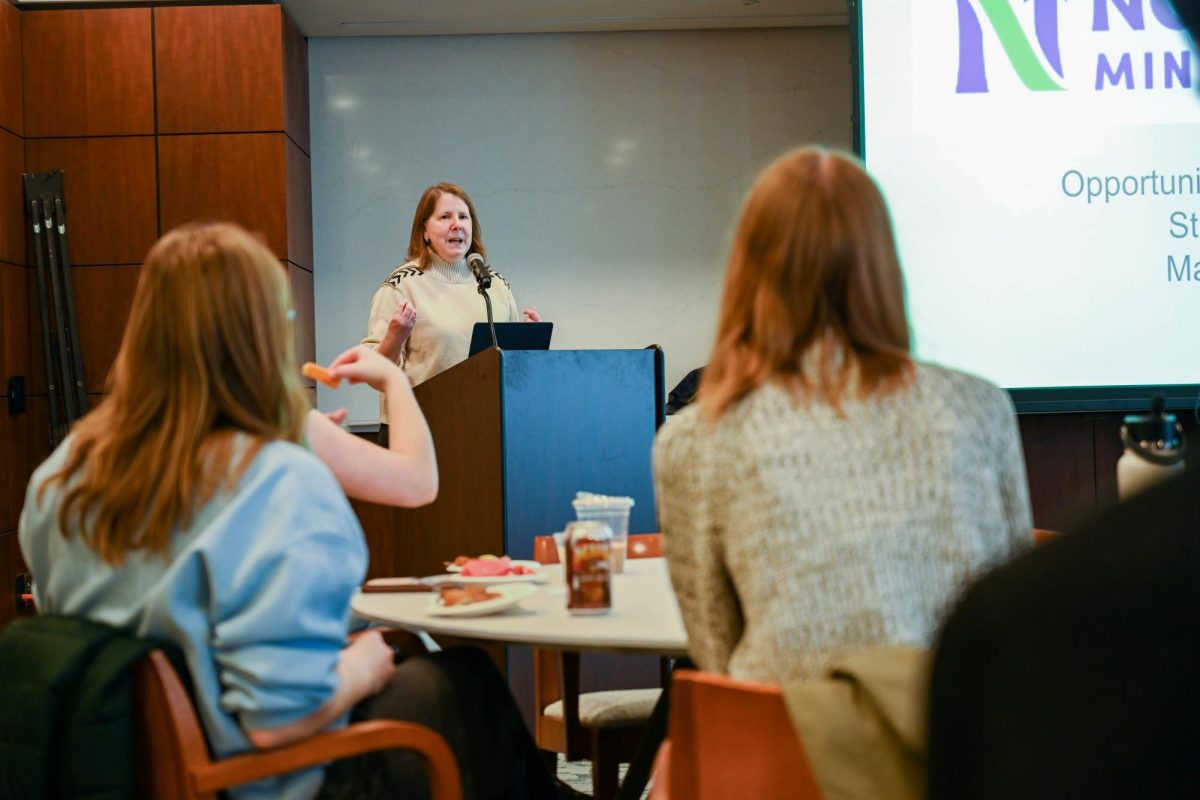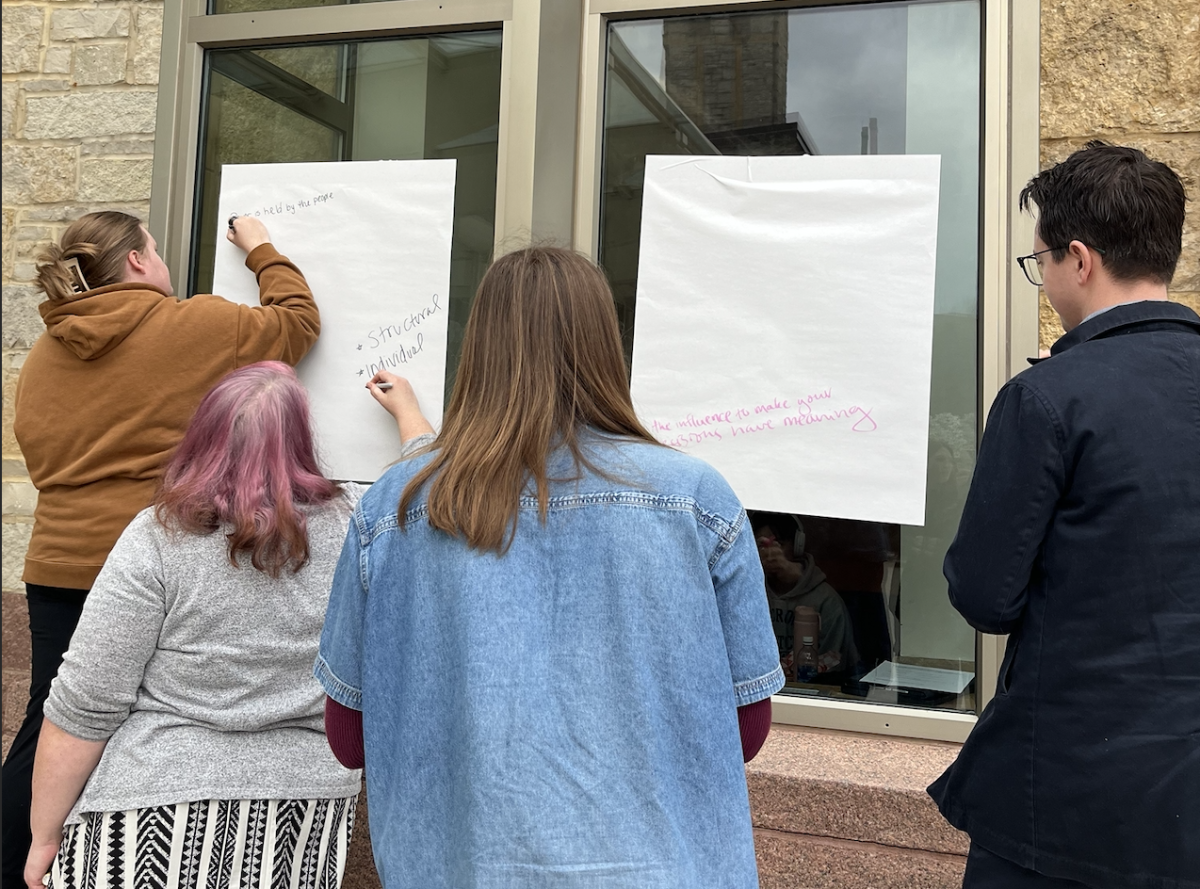The Presidential Search Committee has begun gathering community input on the selection of the successor to President David Anderson ’74 upon his retirement in 2023.
In February, Storbeck Search — a third-party recruitment group facilitating the search process — invited College affiliates to share their thoughts in an online survey and conducted a series of virtual forums with groups of staff, faculty, and students.
Storbeck specializes in executive placements for liberal arts colleges and nonprofits. According to their representative Julie Tea, a majority of their placements are women and a majority are people of color.
“When they started out by saying ‘We’re a women-founded, women-lead business’ I was like, ‘Woah, St. Olaf chose that?’” said Julia Himmelberger ’22, a student who participated in a virtual forum. “We’ve only ever had white, male, Lutheran presidents, so hopefully this is some sort of symbol of St. Olaf’s recognition that we need to change there.”
Having a receptive outside perspective could prove to be crucial to the outcome of the search. With only one student and four staff and faculty on the search committee, virtual forums and surveys have been the primary platform for members of the campus community to express their hopes and concerns for new leadership.
As students and the wider St. Olaf community continue to express their opinions through these forums, a few concerns have received heightened attention as the College looks for leadership into a new era.
High priority on DEI
Efforts to invest in equity and address racism on campus featured strongly in the responses from many students, staff, faculty, and alumni.
María Pabón Gautier, Vice President for Equity and Inclusion and staff representative on the Presidential Search Committee, expressed her hope that the new president is “engaged with diversity, equity, inclusion, and justice work and understands that it is necessary, essential, dynamic, hard, and ongoing.”
According to Anthony Bateza, professor of religion and faculty representative, much of the faculty discussion also focused on issues of diversity, equity, and inclusion (DEI). The administration’s willingness to address racism on campus affects “how we attract a diverse faculty pool, how we get folks to stay, how we get folks to want to stay, not just out of a sense of obligation or compulsion, but out of a feeling that their voice is heard and they’re being allowed to reshape the community,” Bateza said.
Bateza also expressed his hope of finding a candidate who is committed to both addressing issues of equity and justice as well as maintaining the College’s financial strength by “helping to provide fair benefits and wages to staff and faculty, while doing their best to lower the debt load and make this a more affordable and accessible place for people from different economic backgrounds.”
Bateza continued, “I think we’re often forced to choose one or the other, but I think we should hold out for a president who thinks both of those are important and can bring both of those together.”
Prioritizing DEI was also a common sentiment amongst students in the virtual forums, as many cited the College’s response to racism on campus as one of the most pressing issues the new president will have to address.
Several students expressed their frustration with the current administration’s continued inaction.
“We get a lot of surveys and things kind of addressing campus culture but then it doesn’t really feel like much changes,” Miriam Clapp ’24 said.
“The school has been very performative with little action to back up their statements,” wrote Giovanni Green ’24 in an email to the Messenger. “We always claim to denounce certain views and behaviors but do very little to change the structure we have in place at the school.”
Students also spoke about the necessity of a new president’s increased presence on campus and respect for student perspectives.
“The new administration must not simply be visible, but must listen,” Green wrote. “This is a smaller institution, so getting to know and understand students’ wants, needs, and ideas are crucial.”
Clapp said she would value a president with a “willingness to admit when they made a mistake and a willingness to listen to and learn from students and actually take our voices into account in decision making.”
ORACE, a collective of St. Olaf alumni and affiliates dedicated to advocating for anti-racist institutional policies, began a petition in 2020 calling for new leadership in light of the 2017 student protests and continuing departures of staff and faculty of color.
In the petition, ORACE outlines their criteria for anti-racist leadership:
-Understand race and racism historically and in the current context.
-Demonstrate experience, dedication, and enthusiasm for anti-racist work.
-Examine every aspect of the college through the lens of anti-racism.
-Embrace the inherent discomfort in anti-racist work
-Lead with humility and courage
In a recent conversation with the Messenger, ORACE members Jane Burnett ’72 and Dawn Tommerdahl reiterated the group’s desire to see a new president with these characteristics.
Burnett articulated the need for “somebody who already, out of their own interest and passion and concern, has taken steps to understand racism and to be active against it.”
She and Tommerdahl stressed the importance of a president who will familiarize themself with the history of race on campus and the College’s progress toward meeting student demands, someone committed to fostering “an antiracist education within an antiracist institution.”
To ELCA or not to ELCA?
At the beginning of the search process the Board of Regents voted unanimously to adjust the former requirement that the president be a member of the Evangelical Lutheran Church of America (ELCA), opening up the search to members of denominations “in full communion with the ELCA,” Stephanie Fehr ’87, regent and search committee spokesperson, wrote in an email to the Messenger. This expansion is limited to six other Protestant Chrisitan denominations.
Fehr attributes the decision to expand the search criteria to the Board’s desire to consider candidates from a larger, more diverse pool.
Bateza describes St. Olaf’s unique position as an institution that has neither held on strictly to its Lutheran heritage nor forsaken its religious affiliation completely. “I think that Olaf represents an attempt to not do either of those things and maybe go a third way,” Bateza said.
“There’s a desire to hold on to that good piece of it without wanting to exclude great candidates who might have an appreciation of the Lutheran tradition but aren’t members of it,” Bateza continued. “There are faculty and students at St. Olaf who aren’t Lutheran, who aren’t religious, who are of non-Christian religions or no religion at all who all sort of believe in St. Olaf’s mission in one way or another, and so I think the hope is that this strikes a balance of some kind.”
The College’s relationship with its Lutheran tradition has been under scrutiny since faculty and students began calling for an examination and deconstruction of “Ole Culture” in 2020. For some students and community members, the selection of a non-Lutheran leader would serve as a symbol of the College’s willingness to prioritize current and future students over adherence to the school’s roots.
“I hope they don’t pick a Lutheran,” Himmelberger said. “I think it could be really great for St. Olaf to have someone not connected to the school, not a former student. I think part of the issue that we’ve had is people wanting to hold onto these traditions that aren’t necessarily the most inclusive and don’t really match what St. Olaf is now.”
Storbeck will be hosting on-campus forums in March to continue gathering feedback from the St. Olaf community. Throughout the spring and summer, Storbeck and the search committee will recruit and review candidates based on criteria identified in the forums and feedback survey. After a series of interviews and campus visits with finalists over the coming summer and fall, the search committee will recommend candidates to the Board of Regents. The final decision is ultimately in the hands of the Board, and the announcement will be made during the next academic year.
When asked about student concerns that the interests of the Board will take precedence over the priorities of the current campus community, Fehr wrote in an email to the Messenger, “As we continue to collect stakeholder input, we’re seeing a lot of consistent perspectives, but also hearing diversity of thought, which makes this process even more informative. An important part of this search process is to bring the entire St. Olaf community along with us during the search, continue to surface new thinking, and have discussions that will yield the best way forward.”
Other members of the search committee acknowledged the challenge of reconciling potentially conflicting stakeholder priorities. “Balancing the interests of students, faculty, staff, alumni, and other groups is absolutely one of the biggest challenges and opportunities of this search, so I’m glad people from across our community have been eager to share their thoughts,” Pabón Gautier said.
Bateza notes that so far the Board members on the search committee have been receptive to the observations of himself, the student and staff representatives, and Louis Epstein, associate professor of music and the other faculty member on the committee. “I don’t get the sense that anyone has their thumb on the scale or is controlling the process, that it really is meant to be an open and honest and transparent conversation about the future of the college,” Bateza said.
Students and community members who wish to express their hopes and concerns about the selection of a new president should reach out to members of the search committee and keep an eye out for continuing opportunities to provide input.
